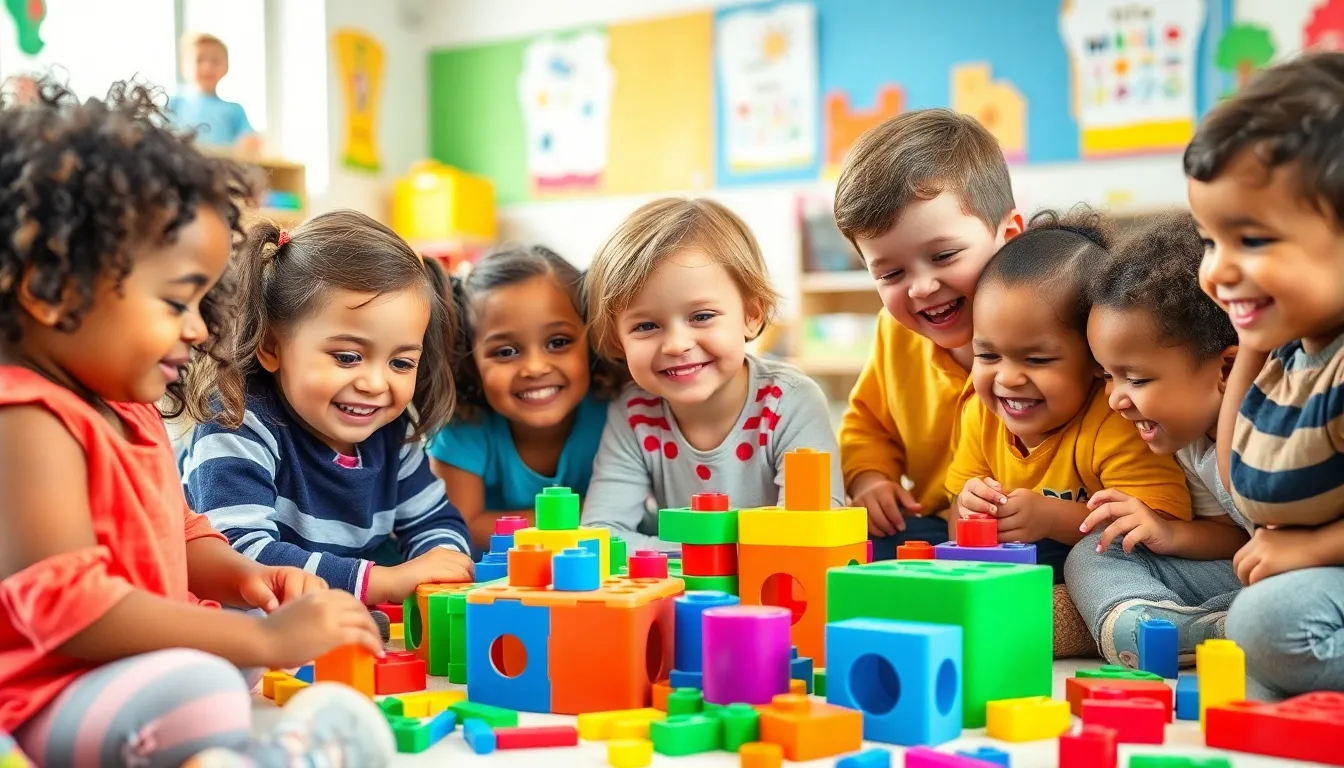In a world where playtime and learning go hand in hand, educational toys have emerged as essential tools for childhood development. These toys not only entertain but also stimulate creativity and critical thinking, paving the way for a brighter future. Parents and educators alike recognize the value of engaging children in play that promotes cognitive and social skills.
From building blocks that enhance spatial awareness to puzzles that sharpen problem-solving abilities, educational toys cater to a variety of interests and age groups. As children explore these interactive tools, they develop essential life skills while having fun. Understanding the impact of educational toys can help parents make informed choices that foster a love for learning in their little ones.
Table of Contents
ToggleWhat Are Educational Toys?
Educational toys are specifically designed to facilitate learning and development in children. These toys engage various skills, including cognitive, social, and emotional abilities. Examples of educational toys include building blocks, puzzles, and art supplies. Each type targets different areas of growth.
- Building Blocks: Building blocks enhance spatial awareness and fine motor skills. They encourage creativity and imaginative play.
- Puzzles: Puzzles improve problem-solving abilities and critical thinking. They promote hand-eye coordination and patience.
- Art Supplies: Art supplies foster creativity and self-expression. They help develop fine motor skills and confidence in artistic abilities.
- STEM Toys: STEM (Science, Technology, Engineering, Math) toys stimulate interest in these fields. They promote analytical thinking and encourage exploration.
Educational toys provide a hands-on approach to learning. They motivate children to explore new concepts while making learning enjoyable. Parents play a crucial role in selecting toys that suit their child’s interests and developmental stage. Prioritizing educational toys supports a love for learning and builds essential skills for future success.
Benefits of Educational Toys

Educational toys play a crucial role in a child’s development. They not only entertain but also promote essential skills for lifelong learning.
Cognitive Development
Educational toys significantly enhance cognitive skills in children. They encourage problem-solving and critical thinking through interactive experiences. For example, puzzles stimulate logical reasoning, while building blocks enhance spatial awareness. Research shows that children who engage with educational toys display improved memory retention, concentration, and the ability to think abstractly. Additionally, STEM toys foster interest in scientific concepts, nurturing analytical skills that are essential in today’s technology-driven world.
Social Skills
Educational toys also promote social skills through collaborative play. Children learn to share, communicate, and resolve conflicts while engaging with peers. For instance, board games require teamwork and strategy negotiation, enhancing cooperation. Role-playing toys encourage empathy as children step into different characters’ shoes, facilitating emotional understanding. Studies indicate that children involved in social play demonstrate improved interpersonal skills, leading to better relationships in future social scenarios.
Types of Educational Toys
Educational toys come in various categories, each designed to target specific developmental skills in children. The following sections detail popular types of educational toys.
STEM Toys
STEM toys focus on science, technology, engineering, and math concepts. They engage children in hands-on activities that promote analytical thinking and problem-solving. Examples include coding kits, robotics sets, and construction toys. These toys often feature interactive components that encourage exploration and experimentation, catering to different age groups. Studies demonstrate that exposure to STEM toys enhances critical thinking skills and prepares children for future careers in technology and engineering fields.
Art and Craft Toys
Art and craft toys stimulate creativity and self-expression in children. Items such as drawing sets, modeling clay, and craft kits allow children to explore their artistic talents and develop fine motor skills. Engaging in art activities fosters critical thinking and encourages decision-making as children choose colors, shapes, and materials. Research indicates that art promotes emotional intelligence and resilience, making these toys valuable for holistic development.
Language and Literacy Toys
Language and literacy toys support reading, writing, and communication skills. Examples include alphabet puzzles, phonics games, and storybooks. These toys introduce vocabulary and encourage storytelling, enhancing children’s language development. Interactive features, like sound buttons and visual cues, captivate children’s attention, making learning engaging. Studies show that children exposed to language-rich toys exhibit improved literacy skills and a greater love for reading, which is crucial for academic success.
How to Choose the Right Educational Toy
Selecting the right educational toy involves understanding a child’s age, interests, and developmental needs. This ensures engagement and maximizes the toy’s learning potential.
Age Appropriateness
Choosing toys that match a child’s age is crucial for effective learning. For infants to toddlers, soft toys and basic building blocks encourage sensory exploration and fine motor skills. Preschoolers benefit from puzzles and art supplies that promote problem-solving and creativity. For school-aged children, STEM kits and advanced puzzles foster critical thinking and analytical skills. Always check the manufacturer’s age recommendations to ensure safety and developmental relevance.
Interests and Skills
Identifying a child’s interests enhances engagement with educational toys. A child fascinated by nature may thrive with science kits that explore biology or ecology. If a child enjoys storytelling, books and drama kits stimulate language skills and creativity. Additionally, assess the skills the toy develops; toys promoting teamwork like board games help enhance social skills, while individual-focused toys like construction sets boost independent problem-solving capabilities. Matching toys to both interests and developmental skills increases motivation and encourages a lifelong love for learning.
Educational toys play a crucial role in shaping a child’s development. By combining fun and learning they help foster essential skills that benefit children both now and in the future. When parents choose toys that align with their child’s interests and developmental stage they create opportunities for engagement and growth.
These toys not only enhance cognitive abilities but also promote social skills through collaborative play. Investing in educational toys is an investment in a child’s future. As children explore and learn through play they cultivate a lifelong passion for knowledge and creativity.









